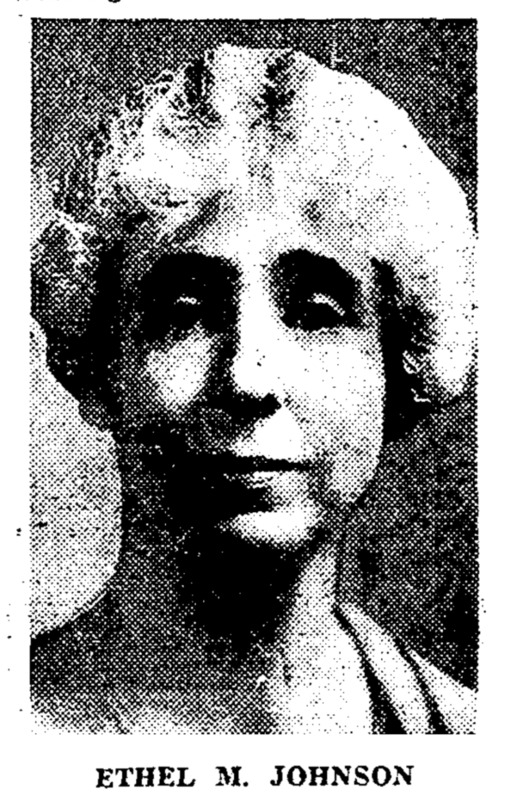Ethel M. Johnson '10
Dublin Core
Title
Ethel M. Johnson '10
Description
Ethel M. Johnson, pictured here in a 1940 Boston Globe article, was born around 1882 in Brownfield, Maine. She grew up on a farm and attended the Parsonsfield Seminary before studying library science, economics, and secretarial studies at Simmons. Johnson paid her own way through college, teaching and doing odd jobs to earn enough for tuition. She left school twice to earn more money and to care for her ailing mother, before graduating in 1910. At Simmons, Johnson was known as an outspoken suffragist, distributing pro-suffrage leaflets on campus.
After graduation, Johnson remained in Boston and took a job as a librarian for the Women’s Educational and Industrial Union, where she worked with the union’s legislative committee on industrial bills and developed a union library of books about industrial conditions for women workers. In 1918, she left the union— allegedly after offending its anti-suffrage members with her pro-suffrage views— to work as a secretary for the Congressional Committee of the Massachusetts Woman Suffrage Association. Still, Johnson considered her views “conservative” in comparison to those of more “militant” suffragists. “I have never anticipated that suffrage among women would bring immediate reforms,” she told a Boston Globe reporter in 1919, “but I do believe that it will broaden women generally and ultimately will yield a higher standard of citizenship among women.”
In 1919, Massachusetts Governor Calvin Coolidge appointed Johnson the state’s Assistant Commissioner of Labor and Industry, the first woman to hold the position. Despite backlash from conservative politicians, she was reappointed by subsequent governors until her term ended in 1931. Johnson left Boston, serving as an economist for the California State Unemployment Commission until 1933, when Governor John Winant of New Hampshire named her Director of the state’s Minimum Wage Office on the recommendation of Secretary of Labor Frances Perkins. As an economist and a politician, Johnson was primarily interested in protecting the labor rights of women and children. She penned numerous newspaper and magazine articles about industrial labor conditions, and in 1924, she spoke in support of a federal amendment to regulate child labor.
In 1940, Johnson moved to Washington, D.C., taking a position as Director of an International Labor Office branch there. Little information remains about her later life, though she continued to contribute political articles to several newspapers, including the Boston Globe, until 1957. Johnson also served at various times as secretary and treasurer of the American Library Association, associate editor of the ALA’s Special Libraries journal, and Vice Chairman of the Legislative Committee of the Boston City Federation of Women’s Clubs. She was also a member of the Massachusetts Council of Women and the Council on Women and Children in Industry. Simmons continues to offer an endowed scholarship in her name.
After graduation, Johnson remained in Boston and took a job as a librarian for the Women’s Educational and Industrial Union, where she worked with the union’s legislative committee on industrial bills and developed a union library of books about industrial conditions for women workers. In 1918, she left the union— allegedly after offending its anti-suffrage members with her pro-suffrage views— to work as a secretary for the Congressional Committee of the Massachusetts Woman Suffrage Association. Still, Johnson considered her views “conservative” in comparison to those of more “militant” suffragists. “I have never anticipated that suffrage among women would bring immediate reforms,” she told a Boston Globe reporter in 1919, “but I do believe that it will broaden women generally and ultimately will yield a higher standard of citizenship among women.”
In 1919, Massachusetts Governor Calvin Coolidge appointed Johnson the state’s Assistant Commissioner of Labor and Industry, the first woman to hold the position. Despite backlash from conservative politicians, she was reappointed by subsequent governors until her term ended in 1931. Johnson left Boston, serving as an economist for the California State Unemployment Commission until 1933, when Governor John Winant of New Hampshire named her Director of the state’s Minimum Wage Office on the recommendation of Secretary of Labor Frances Perkins. As an economist and a politician, Johnson was primarily interested in protecting the labor rights of women and children. She penned numerous newspaper and magazine articles about industrial labor conditions, and in 1924, she spoke in support of a federal amendment to regulate child labor.
In 1940, Johnson moved to Washington, D.C., taking a position as Director of an International Labor Office branch there. Little information remains about her later life, though she continued to contribute political articles to several newspapers, including the Boston Globe, until 1957. Johnson also served at various times as secretary and treasurer of the American Library Association, associate editor of the ALA’s Special Libraries journal, and Vice Chairman of the Legislative Committee of the Boston City Federation of Women’s Clubs. She was also a member of the Massachusetts Council of Women and the Council on Women and Children in Industry. Simmons continues to offer an endowed scholarship in her name.
Creator
The Boston Globe
Date
November 9, 1940
Citation
The Boston Globe, “Ethel M. Johnson '10,” Suffrage at Simmons, accessed February 18, 2026, https://beatleyweb.simmons.edu/suffrage/items/show/75.
